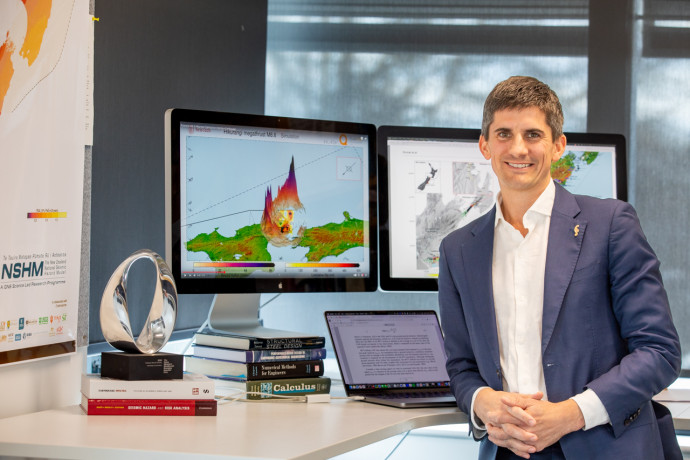2025 Scott Medal:Deescalating earthquakes from ‘disaster’ to ‘nuisance’ through resilience research

Professor Brendon Bradley FRSNZ of Te Whare Wānanga o Waitaha – the University of Canterbury has won the Scott Medal for pioneering research in earthquake science and engineering, and for translating these findings to advance seismic resilience in New Zealand and internationally.
Brendon has pioneered new methods for ground-motion simulation which can identify areas that will experience the strongest earthquake shaking. His models use massive datasets, including the geological and geophysical properties of rock and soil at specific locations. This approach allows earthquake-strengthening efforts to be prioritised in vulnerable areas and where failure would be critical, resulting in more resilient buildings and infrastructure, while managing the costs.
Brendon has co-authored a landmark textbook on seismic hazards and risk analysis and was a major contributor to the 2022 update of our National Seismic Hazard Model that forecasts the likelihood of ground-shaking around the country and informs the design standards for all civil construction.
Brendon co-established QuakeCORE as a centre of research excellence, serving as a director for 9 years. He also displayed leadership in communicating lessons from the 2010–11 Canterbury and 2016 Kāikoura earthquakes – not only in Aotearoa but around the world.
“My vision for earthquake engineering is a future where quakes are just nuisances – people feel the shaking but generally resume life immediately, to a much greater extent than presently,” Brendon says.
His work on earthquake resilience was primarily inspired by the 2010–2011 Canterbury and 2016 Kaikoura earthquakes and the impact on fellow New Zealanders.
Brendon earned his undergraduate degree and PhD in engineering at the University of Canterbury, worked at GNS Science and completed a postdoc in Japan. He returned to the University of Canterbury just 9 months before the first Canterbury earthquake and he was in Tokyo when the magnitude 9 Tōhuku earthquake struck.
The professional work following these earthquakes offered Brendon “amazing insights from working with top experts,” but they also created a very demanding period for him.
Brendon thinks of the periods between major earthquakes in New Zealand as “peace time” and stresses that we must make use of them to prepare.
“We have many of the technologies now to drastically improve the resilience of physical infrastructure, but we lack the cost-effectiveness and efficiencies to deploy them at scale, and also the resolution to understand exactly which areas and buildings are most at risk.
“It may take 50+ years to realise this vision, but resilience is about improving, brick-by-brick on a daily basis – there are no quick fixes. It requires ongoing societal commitment to resilience, not just reaction after disasters.
“This means prioritising policy, education, and infrastructure to protect our communities economically and effectively,” he said.
Brendon acknowledges that the work being recognised by the Scott Medal is a collective effort with many national and international collaborators.
He wishes to give thanks to his graduate research students and to his New Zealand-based colleagues who helped establish QuakeCoRE as a national centre of research excellence.
“It’s nice to see the continued recognition of the importance of world-leading earthquake resilience research, given New Zealand’s vulnerability in this regard.”
Scott Medal:
For outstanding contributions towards the advancement of engineering sciences and technologies, and their applications.
Citation:
To Brendon Archie Bradley for pioneering research in earthquake engineering, its translation to practice, and leadership of QuakeCoRE, which has advanced seismic resilience in New Zealand and internationally.
